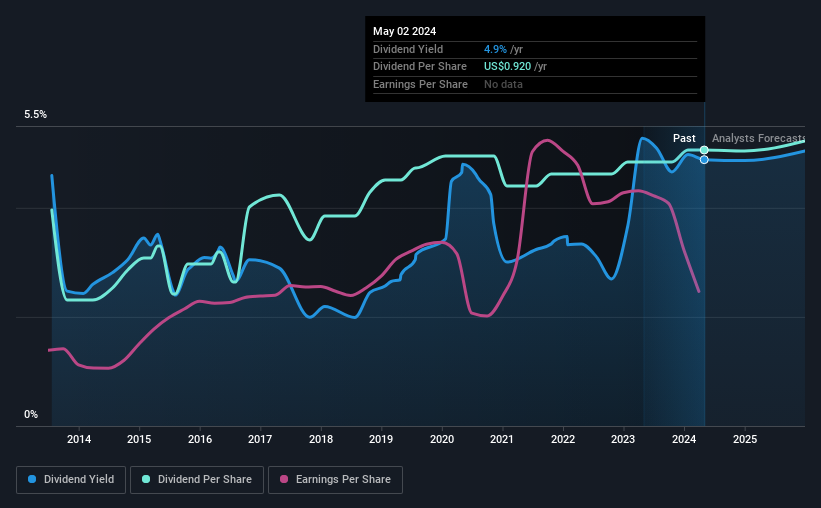Stock Analysis
- United States
- /
- Banks
- /
- NasdaqGS:HFWA
Don't Race Out To Buy Heritage Financial Corporation (NASDAQ:HFWA) Just Because It's Going Ex-Dividend

Some investors rely on dividends for growing their wealth, and if you're one of those dividend sleuths, you might be intrigued to know that Heritage Financial Corporation (NASDAQ:HFWA) is about to go ex-dividend in just 3 days. Typically, the ex-dividend date is one business day before the record date which is the date on which a company determines the shareholders eligible to receive a dividend. The ex-dividend date is important because any transaction on a stock needs to have been settled before the record date in order to be eligible for a dividend. In other words, investors can purchase Heritage Financial's shares before the 7th of May in order to be eligible for the dividend, which will be paid on the 22nd of May.
The company's upcoming dividend is US$0.23 a share, following on from the last 12 months, when the company distributed a total of US$0.92 per share to shareholders. Looking at the last 12 months of distributions, Heritage Financial has a trailing yield of approximately 4.9% on its current stock price of US$18.84. Dividends are an important source of income to many shareholders, but the health of the business is crucial to maintaining those dividends. So we need to check whether the dividend payments are covered, and if earnings are growing.
See our latest analysis for Heritage Financial
Dividends are typically paid from company earnings. If a company pays more in dividends than it earned in profit, then the dividend could be unsustainable. Heritage Financial is paying out an acceptable 66% of its profit, a common payout level among most companies.
Generally speaking, the lower a company's payout ratios, the more resilient its dividend usually is.
Click here to see the company's payout ratio, plus analyst estimates of its future dividends.

Have Earnings And Dividends Been Growing?
Stocks with flat earnings can still be attractive dividend payers, but it is important to be more conservative with your approach and demand a greater margin for safety when it comes to dividend sustainability. If earnings decline and the company is forced to cut its dividend, investors could watch the value of their investment go up in smoke. With that in mind, we're not enthused to see that Heritage Financial's earnings per share have remained effectively flat over the past five years. We'd take that over an earnings decline any day, but in the long run, the best dividend stocks all grow their earnings per share.
Many investors will assess a company's dividend performance by evaluating how much the dividend payments have changed over time. In the past 10 years, Heritage Financial has increased its dividend at approximately 2.5% a year on average.
To Sum It Up
Has Heritage Financial got what it takes to maintain its dividend payments? Heritage Financial's earnings per share have been essentially flat, and the company is paying out more than half of its earnings as dividends to shareholders. This is not an overtly appealing combination of characteristics, and we're just not that interested in this company's dividend.
With that in mind though, if the poor dividend characteristics of Heritage Financial don't faze you, it's worth being mindful of the risks involved with this business. Our analysis shows 2 warning signs for Heritage Financial and you should be aware of these before buying any shares.
If you're in the market for strong dividend payers, we recommend checking our selection of top dividend stocks.
Valuation is complex, but we're helping make it simple.
Find out whether Heritage Financial is potentially over or undervalued by checking out our comprehensive analysis, which includes fair value estimates, risks and warnings, dividends, insider transactions and financial health.
View the Free AnalysisHave feedback on this article? Concerned about the content? Get in touch with us directly. Alternatively, email editorial-team (at) simplywallst.com.
This article by Simply Wall St is general in nature. We provide commentary based on historical data and analyst forecasts only using an unbiased methodology and our articles are not intended to be financial advice. It does not constitute a recommendation to buy or sell any stock, and does not take account of your objectives, or your financial situation. We aim to bring you long-term focused analysis driven by fundamental data. Note that our analysis may not factor in the latest price-sensitive company announcements or qualitative material. Simply Wall St has no position in any stocks mentioned.
About NasdaqGS:HFWA
Heritage Financial
Operates as the bank holding company for Heritage Bank that provides various financial services to small and medium sized businesses and individuals in the United States.
Flawless balance sheet average dividend payer.


